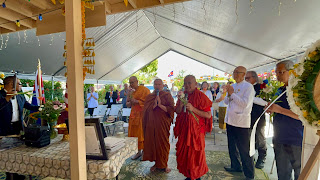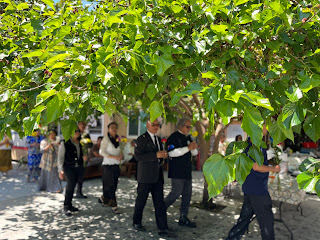Picture taken on July 24, 2024 in Cambodia
A Personal Reflection on Cambodia in 2024: Change is Underway
As 2024 draws to a close, it presents an ideal opportunity to reflect on the significant progress and achievements made by the brave men and women working tirelessly both inside and outside Cambodia. For decades, the government—first under Hun Sen and now under his son, Hun Manet—has overseen relative peace, political stability, and economic growth. However, serious criticisms remain regarding its failure to prioritize the well-being and freedom of its people. Initiatives such as “ទិវាជ័យជម្នះប្រាំពីរមករា,” “នយោបាយឈ្នះឈ្នះ,”“អរគុណសន្តិភាព” ('Victory Day on 7 January', the 'Win-Win Policy,' and the “Thank You Peace” slogan) orchestrated by the ruling party have been praised by some, but many argue that the government's actions have often neglected the basic rights and needs of ordinary Cambodians. Critics contend that despite political stability, increased foreign investment, infrastructure development, and economic achievements, the government has consistently overlooked the well-being and freedoms of its citizens, allowing corruption, inequality, and authoritarian practices to persist.
This year, courageous individuals inside and outside the country refused to stand by and allow political events to unfold without the people’s consent. They made significant strides in resisting and confronting a range of challenges: crackdowns on opposition parties, dissenting voices, independent media, and civil society; suppression of rights; erosion of democratic values; deforestation and land grabs; familism and nepotism; widespread corruption and social inequality; systematic injustice; and the total consolidation of power by a one-party state. Their unwavering determination has left a meaningful impact and an indelible mark on our beloved motherland.
In addition to raising their voices locally and globally, these courageous individuals have brought people together, held influential leaders, wealthy elites, and powerful government officials accountable, and driven fair policy changes. They have advocated for greater fairness, transparency, and accountability on key issues such as the Funan Techo Canal project, the Cambodia-Laos-Vietnam (CLV) Development Triangle, and Koh Kut’s ownership. By pressing leaders to take meaningful, inclusive, and lasting action, they have reminded us that when people unite and fight with common voices and values, they can free themselves from fear, want, and indignity.
While much work remains, these modest yet meaningful victories affirm an important truth: change is not only possible—it is happening. The unwavering dedication and bravery of these individuals in challenging and standing up against authoritarianism continue to inspire hope for a more just and equitable future for all Cambodians, not just a privileged few.
Context and Supporting Facts
- Crackdowns on Opposition, Civil Society, and Media: In recent years, Cambodia has witnessed systematic suppression of opposition parties, civil society, and independent media. The forced dissolution of the Cambodia National Rescue Party (CNRP), the sentencing of former CNRP leader Kem Sokha to 27 years under house arrest, the disqualification of the Candle Light Party from contesting the July 2023 election, the shutdown of the country's only popular independent VOD news outlet, and the harassment and imprisonment of journalists and dissenters highlight the ongoing erosion of democratic principles. However, grassroots movements and international advocacy have brought global attention to these injustices, fostering increased scrutiny and support.
- Deforestation and Environmental Concerns: Despite the government’s promises to address illegal logging and land reforms, deforestation and land grabbing remain unchecked in Cambodia and continue unabated despite the efforts of NGOs and countless protests. In 2001, Prime Minister Hun Sen promised to personally tackle deforestation and illegal logging, stating, “I will cut my own head off” (if the licenses of companies engaged in illegal logging were not revoked). However, Cambodia's forests continue to be devastated at an alarming rate. Projects like the Funan Techo Canal have been criticized for their environmental and social impacts. Activists have raised awareness, pressuring authorities to adopt more sustainable and inclusive approaches.
- Regional Cooperation: The Funan Techo Canal Project has caused new tensions between Vietnam and Cambodia and sparked debates over its security implications for Vietnam. The Cambodia-Laos-Vietnam Development Triangle exemplifies the complexities of regional development. While it offers economic opportunities, concerns about exploitation and unequal benefits persist. Recently, Koh Kut Island has become a contentious dispute area between Cambodia and Thailand. While Koh Kut is widely recognized as part of Thailand’s Trat Province, Cambodian activists living abroad have mainly held protests to bring the Koh Kut case to the International Court of Justice.
- Resistance to Rule of Laws, Corruption, and Nepotism: While government officials dismiss the findings of the report, Cambodia ranks 141st out of 142 countries on the Rule of Law Index (second to last), according to the World Justice Project (WJP) report released in October 2024. Additionally, the 2023 Corruption Perceptions Index (CPI) places Cambodia 158th out of 180 countries, making it the second most corrupt country in ASEAN. Familism, nepotism, and blind loyalty among officials have entrenched inequalities within Cambodia’s political and economic systems. The current leadership has fostered a framework where upward mobility often feels more like a myth than a reality. However, civil society organizations and activists are questioning and challenging these divisive practices, advocating for meritocracy and fairness. These brave individuals have raised their voices through protests, international advocacy, petitions, and legal challenges, bringing attention to human rights abuses and environmental degradation.
Conclusion
The efforts of these brave individuals highlight a profound and complex reality: meaningful change requires collective action, resilience, and courage. Silencing, instilling fear, and suppressing those who disagree with the current political agenda are not effective ways to achieve sustainable peace, stability, national reconciliation, and inclusive development. Good never arises from force or fear. As Cambodia transitions into 2025, the momentum generated in 2024 demonstrates the power of unity and the enduring hope for a better future.
The challenges ahead are daunting, but the actions of these brave men and women remind us that a brighter, more just future is possible. They have shown that Cambodians are capable of standing up against entrenched systems of power, familism, nepotism, and the unequal distribution of wealth and land. Their courage inspires the next generation and ordinary citizens to speak out and demand justice, accountability, equity, and freedom.
May all Cambodians see and understand the reality of what is truly happening in our broken homeland. May all Cambodians live free from fear and want, embracing a life of dignity.
The views, opinions, and interpretations expressed in this reflection are my own and do not necessarily reflect those of others.
References:
Freedom House Cambodia
https://freedomhouse.org/country/cambodia/freedom-world/2024
Human Rights Watch Cambodia
https://www.hrw.org/world-report/2024/country-chapters/cambodia
Re-imagining Cambodia today and beyond
https://www.nationthailand.com/perspective/30350918
Cambodia: Opposition Candlelight Party barred from July vote
https://www.bbc.com/news/world-asia-65478798
Opposition abroad accused of provoking border dispute over Koh Kut
https://www.khmertimeskh.com/501596196/opposition-abroad-accused-of-provoking-border-dispute-over-koh-kut/
PM Stresses Political Maturity in Resolving Koh Kut Dispute
https://kiripost.com/stories/pm-stresses-political-maturity-in-resolving-koh-kut-dispute
Hun Manet dismisses nepotism accusations after brother’s promotion
https://www.rfa.org/english/news/cambodia/cambodia-hun-many-nepotism-02222024173706.html
Cambodia pulls out of a regional development pact after protests
https://apnews.com/article/cambodia-vietnam-laos-agreement-ddb4e90a277291fa26d33e58ea59f6e9
Was There Actually a Cambodian Victory Over Genocide on January 7, 1979? https://khmerpostusa.com/was-there-actually-a-cambodian-victory-over-genocide-on-january-7-1979/
Cambodia: Arrests Target Critics of Regional Development Zone
https://www.amnesty.org/en/latest/news/2024/08/cambodia-arrests-target-critics-of-regional-development-zone/
Cambodia: Arrests Target Critics of Regional Development Zone
The murky waters of Cambodia’s Funan Techo Canal
https://www.lowyinstitute.org/the-interpreter/murky-waters-cambodia-s-funan-techo-canal
The Funan Techo Canal And Vietnam’s Maritime-Continental Dilemma – Analysis
Cambodia’s Land Grabbing Crisis
https://thecontrapuntal.com/cambodias-land-grabbing-crisis/
Civil society and development in Cambodia: Challenges and opportunities for anti-corruption
Human Insecurity Scourge: The Land-Grabbing Crisis in Cambodia
https://www.academia.edu/121687579/Human_Insecurity_Scourge_The_Land_Grabbing_Crisis_in_Cambodia
Human Security and Land Rights in Cambodia. Phnom Penh: Cambodian Institute for Cooperation and Peace.
The Voices of Change in Cambodia
https://www.academia.edu/41643664/The_Voices_of_Change_in_Cambodia_
Cambodia Again Ranks Second to Last on Rule of Law Index; Officials Dismiss Findings
Transparency International Cambodia
https://www.ticambodia.org/cpi2023/
The Wood for the Trees
https://southeastasiaglobe.com/logging-cambodia-focus-asean/















